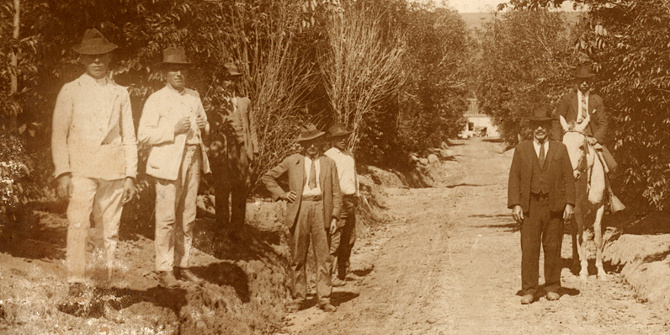 Poverty is the consequence and not the cause of informal entrepreneurship, and vulnerable populations must be supported rather than repressed in their efforts to escape poverty and low-quality work, writes Pablo Navarrete (LSE Geography and Environment).
Poverty is the consequence and not the cause of informal entrepreneurship, and vulnerable populations must be supported rather than repressed in their efforts to escape poverty and low-quality work, writes Pablo Navarrete (LSE Geography and Environment).
The informal economy accounts for around two-fifths of global GDP and approximately two in every three jobs worldwide, playing a major role in economic growth and job creation, particularly in the developing world. Contrary to earlier predictions, rather than decreasing in line with economic development, it has in fact remained stable in Africa and expanded in Latin America and Asia.

Despite these contributions, the informal economy is often perceived as a block on economic progress, particularly in terms of decent employment.
First, it has traditionally been associated with low levels of capitalisation and skills, thereby implying poor productivity potential for boosting growth. Second, its lack of regulation and standards lead to it being seen as a hindrance to achieving decent work.
These negative perceptions have fuelled four decades of development policies that have tolerated or neglected these activities (sometimes fostering formalisation), or even actively repressed them. Yet, displacing informal entrepreneurs and confiscating their products threatens the livelihoods of vulnerable populations. Neither are these efforts especially successful, as most academics and policymakers now recognise that the informal economy is here to stay.
This failure to reduce employment generation within the informal economy, combined with an urgent need to promote decent work in line with the eighth of the United Nations 2030 Sustainable Development Goals, will require new and effective policy innovations.
My own research analyses policy approaches in Santiago de Chile that support a diversity of informal activities, evaluating also their potential for improving working conditions amongst vulnerable populations. This work has led me to conclude that given the informal economy’s tendency towards expansion and permanence, the best way to provide decent work is not through repressing the informal sector but through enhancing the quality of the work that it creates.
Why support the informal economy?
Supportive policy approaches from local governments target social inclusion of vulnerable populations rather than promotion of economic growth. These local governments recognise that informal enterprises are mostly small-scale production enterprises involving a few workers or family members and representing a vital source of household income. Clearly, from a social-inclusion perspective, the growth of these enterprises can translate into quality-of-life improvements for the vulnerable households that they support.
Supportive governments have also started to recognise that informal entrepreneurship in developing countries may provide better working conditions than low-skilled formal alternatives. Since reforms in the 1980s led to increased labour flexibility, low-end formal employment slipped ever further away from access to decent salaries, economic progression, job security, freedom of association, and social-protection guarantees.
But the informal economy has since become more competitive in these areas. My research found that between 85% and 95% of informal entrepreneurs would not abandon their current informal enterprise in favour of minimum-wage formal employment, because their current status brings higher monetary and non-monetary returns. In Santiago de Chile, informal employment offers average salaries two to four times higher than the minimum wage, implies a much shorter working day, and offers greater flexibility and independence.
Furthermore, local governments consider that the right types of productivity-focused policies can accelerate growth of informal enterprises, resulting in better informal jobs. Even if often preferable to formal employment, informal entrepreneurship alone does not necessarily provide a secure path to decent employment. Thus, many informal entrepreneurs endure precarious workplaces, minimal job security, and restricted access to social protections. Many informal entrepreneurs also find themselves in “poverty traps”, with their vulnerability tied up with low levels of human capital, physical capital, financial access, market access, and organisation.

Supportive local governments understand that without favourable policy interventions, the evolutionary curve of informal enterprises is essentially flat: workers remain in conditions of poverty for many years, learning through trial and error, transforming small savings into capital and products, establishing few contacts, and only slowly building enough trust amongst peers to establish larger organisations. Public policy can provide the support requirement to speed up this process and foster improvements in productivity, economic growth, and working conditions.
Promoting decent work within the informal economy
To promote decent work, governments must first distance themselves from repressive or tolerant policy approaches and adopt a purely supportive policy environment. A number of progressive municipalities in Santiago de Chile (La Reina, Peñalolén, Santiago, Macúl, and Lo Prado) are following this approach.
By bringing informal entrepreneurs to the policy table, these municipalities have designed comprehensive policy packages to overcome poverty traps in a number of ways:
- offering training programs (vocational and managerial)
- providing capital (large- and small-scale)
- advising on strategies to expand market bases
- strengthening organisation (typically via unions or cooperatives)
- boosting productivity and bargaining power
La Reina and Peñalolén, for instance, have integrated waste-pickers into their municipal waste management systems, organizing them into cooperatives and providing motorised vehicles to aid with waste collection.
La Reina has also provided waste-pickers with a recycling centre, allowing them to sell in higher quantities to large recycling companies and at better prices.
Macúl has invested in street vendors by building covered, electrified, and self-managed street markets. Not only do these markets provide work security and improved physical workspaces, attract more clients, and allow entrepreneurs to diversify into profitable products requiring refrigeration.
Santiago municipality has supported home-based enterprises, providing a zero-interest credit scheme that facilitates entrepreneurs’ investment in products, machinery and infrastructure.
Lo Prado has established a micro-enterprise market with production spaces in its city centre, allowing home-based enterprises to access a new client base and break the low-demand trap of businesses located in poor neighbourhoods.
As supported informal enterprises grow, their employees are able to overcome poverty more quickly, increase their productivity and income, reduce working hours, prevent workplace accidents, and minimise child labour. Thus, vulnerable households move closer to the standards of decent work.
Policymakers in Santiago have come to an important realisation: poverty is the consequence and not the cause of informal entrepreneurship, and vulnerable populations must be supported rather than repressed in their efforts to escape poverty and low-quality work.
Notes:
• The views expressed here are of the authors and do not reflect the position of the Centre or of the LSE
• Please read our Comments Policy before commenting
 Pablo Navarrete – LSE Geography and Environment
Pablo Navarrete – LSE Geography and Environment
Pablo Navarrete is a PhD candidate in Regional and Urban Planning at the LSE. He holds an Architecture Degree from the Universidad de Chile and a double MSc in Urban Policy from Sciences-Po (Paris) and LSE. He has worked as an architect for Chile’s Ministry of Housing and Urban Development and at the Atelier Jean Nouvel in Paris, as chief town planner at La Cisterna Council in the Santiago Metropolitan Region, and as a senior planner for the Chilean Ministry of Transport.






Thank you for your comments Alvaro.
The central argument of this article is that traditional policy approaches (repression and tolerance) have not been effective in reducing the size of the informal economy (IE) as its economic growth and employment generation capacity are currently expanding in Latin America. So, there is a need to look for alternative approaches to promote the sustainable development goals.
The tax debate is important, but secondary in this article that rather focuses on promoting decent work. To address the tax debate we need to consider that, since the IE is here to stay (and even expand), any tax evasion problem will only get worse by keeping adopting the usual repression/tolerance policy approaches. Therefore, even from a tax evasion point of view, there is an urgent need for studying alternative approaches to the IE, such as supportive ones.
My research shows that supporting informal entrepreneurs does not encourage informality, but improve working conditions and productivity of otherwise poor households. Indeed, it may even have the opposite effect, encouraging formalization and tax compliance. Support initiatives promoted by governments bring informal enterprises closer to state control and are commonly negotiated in exchange of increased levels of formalization and regulatory compliance. Moreover, more productive informal enterprises mean a higher capacity to comply with costly regulations. For instance, in La Reina, the municipality supported unorganised waste-pickers who are now legally constituted in a cooperative and formally hire employees paying health and pension contributions. On the other side, waste-pickers in Santiago were repressed and, since they still needed to make a living, they avoided any contact with the government. Repression not only did not end informality, but also made vulnerable people poorer.
Supporting informal enterprises is simply bringing informal enterprises closer to the rule of law with carrots rather than sticks.
With reference to the specific points that you mention, I would like to clarify some issues:
• It is not accurate to state that the informal economy does not pay VAT. The largest part of informal entrepreneurs pay it when purchasing products. For VAT on sales, since the IE is composed of non-recognized enterprises, these cannot discount taxes as many formal enterprises do in Chile. This means that there is substantially a lower “competitive advantage” on tax VAT evasion.
• At the moment of data collection, the category of independent workers has voluntary contributions to the health and pension schemes. Thus, formal enterprises were also avoiding these social contribution payments.
• It is not accurate to state that informal entrepreneurs save on income taxes, and in particular not a 35%. My data collection shows that 95% of them are within an income bracket that in Chile would not pay taxes. It is true that the other small part, 5%, avoid income taxes, but they would not be imposed a 35%.
• There is a difference between the informal economy and the criminal economy. As Portes et al. (1989) clearly point, criminal economy refers to selling or producing illegal products (e.g. stolen goods, drugs, etc.), while the informal economy refers to legal products (e.g. fruits, toys, clothes, etc.) traded by illegal means (without legal permit). In this article, I refer to the latter.
• My research in Chile shows that accessing the informal economy is more a surviving strategy or precarious entrepreneurship motivation rather than a rational way of avoiding taxes. Informality has also several costs, including decommissions, no or reduced access to credits or at high interest rates and, most of the time, exclusion from government schemes to support enterprises development. This explains why many informal enterprises would like to become formal and why bringing informal enterprises closer to the rule of law with carrots rather than sticks seems to work.
What Pablo is not saying is those same entrepreneurs obtain thier benefit evading taxes and social security benefits, health Insurance of their own and their employees. Their competitive Advantage is based on evasion.
1. The do not pay 19% VAT Tax.
2. They hire without paying pension benefits, Health Insurance nor unemployment insurance saving 33% (25% grossed up) cost for them but creating additional burden to the State.
3. Many times they earn considerable amount of money but they qualify to Government benefits they would not qualify if their Income would be reported adequately.
4. They save up to 35% in Income taxes of their own and their employees.
5. Many times they sell stolen products that require no formal receipts
For example an informal entrepreneur that employs 2 persons in addition to himself at a cost of $100 and sells services for $160. Makes a profit of $60. The formal entrepreneur receives 134 (less VAT) and has to pay $33 in pension and health benefits to its workers (assuming they pay no taxes), making $1 profit.
All the “competitive advantage” is based on evading taxes, health benefits and pension. For that reason many people march on the streets for low pensions and bad government health plans. Obviously They do not want to return to formal work because they earn much more this way and because the Chilean government has relaxed its enforcement of informality.